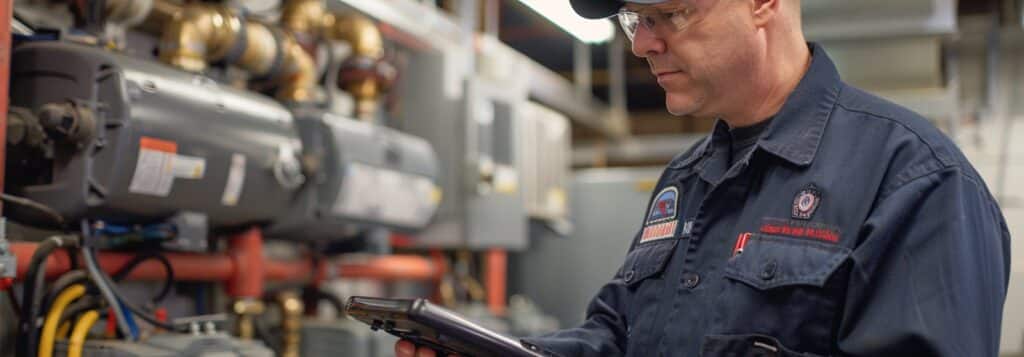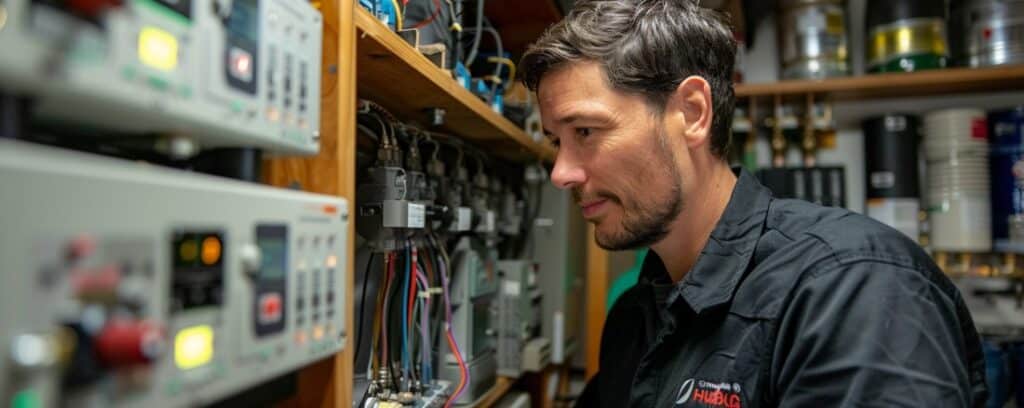- Defining the Role: What Is an HVAC Technician?
- Different Types of HVAC Systems
- Specializations within the HVAC Realm
- Emerging Trends and Technologies in HVAC
- Career Opportunities for HVAC Technicians
- Certifications and Licensing
- Education and Training Programs
- Career Outlook and Compensation Potential
- The Fulfilling Journey of an HVAC Technician
- Additional Resources
In today’s modern world, where comfort is paramount and climate control is intertwined with our daily lives, the HVAC industry stands as a pillar of essential services. Be it the biting cold of winter or the sweltering heat of summer; HVAC systems ensure our environments remain pleasant.
But behind these intricate systems lies the expertise of professionals dedicated to installing, maintaining, and repairing them. This article delves into the heart of the HVAC industry, focusing on a key figure: the HVAC technician.
Defining the Role: What Is an HVAC Technician?
HVAC technicians are more than just service providers; they are skilled artisans, ensuring that our homes, offices, and public spaces remain at optimal temperatures, fostering both comfort and health.
Core Duties and Responsibilities
-
Installation: Whether it’s a new building or an older one in need of an upgraded system, HVAC technicians install heating, ventilation, and air conditioning units efficiently and safely.
-
Maintenance: Regular check-ups, cleaning, and upkeep of HVAC systems fall under their purview. This maintenance ensures that systems run optimally, conserving energy and prolonging equipment lifespan.
-
Repair: When HVAC systems malfunction, technicians diagnose the issue and implement solutions, restoring comfort to affected spaces.
-
Customer Consultation: Technicians often advise customers on the best HVAC systems for their needs, energy conservation methods, and regular maintenance tips.
Technical Skills Meets Customer Service
A blend of hands-on skills and interpersonal strengths is pivotal for HVAC technicians. While they need to be adept with tools, technology, and troubleshooting, they also frequently interact with customers, making communication, and service orientation just as crucial.
Upholding Safety and Compliance
Given that HVAC systems often involve electrical components, refrigerants, and other potential hazards, technicians prioritize safety. Adhering to industry standards, local building codes, and environmental regulations is non-negotiable in their line of work.
In understanding the role of an HVAC technician, we uncover a profession that is both technically demanding and service-oriented. As we delve further into this article, we’ll explore the systems they work with, the specializations they can pursue, and the broader landscape of the HVAC industry.
Different Types of HVAC Systems
To understand the depth of an HVAC technician’s expertise, it’s vital to recognize the variety of systems they work with. As technologies advance and the needs of buildings vary, HVAC systems have evolved to cater to diverse requirements.
Central Heating and Cooling Systems
-
Description: These are the most common types of HVAC systems and involve a central unit that either cools or heats air, which is then distributed throughout the building via ducts.
-
Technician’s Role: Installation of central units, ductwork, and ensuring optimal airflow throughout the structure.
Ductless, Mini-Split Systems
-
Description: Ideal for homes or additions where ductwork isn’t feasible, these systems provide targeted heating or cooling to specific areas or rooms.
-
Technician’s Role: Installing and maintaining individual units, ensuring efficient energy usage and optimal temperature control.
Heat Pumps
-
Description: These systems transfer heat from one place to another, making them efficient for both heating and cooling. They can extract warmth from the air (air-source pumps) or the ground (ground-source or geothermal pumps).
-
Technician’s Role: Installing the appropriate type of heat pump based on the building’s needs, maintaining the system, and ensuring efficient heat transfer.
Radiant Heating
-
Description: Instead of relying on forced air, radiant heating systems warm surfaces (like floors) to radiate heat throughout a space.
-
Technician’s Role: Installing heating elements beneath surfaces, ensuring uniform heat distribution, and maintaining the system for optimal performance.
Hybrid Systems
-
Description: Combining the strengths of various systems, hybrid HVAC solutions might use a furnace with a heat pump, for instance, optimizing energy usage based on current conditions.
-
Technician’s Role: Comprehensive knowledge of combined systems, ensuring seamless integration, and efficient toggling between systems based on needs.
Specializations within the HVAC Realm
Just as there are various HVAC systems, there are numerous specializations within the field, allowing technicians to hone their expertise based on interests and market demands.
Residential vs. Commercial HVAC Technicians
-
Residential: Focusing on homes and smaller buildings, these technicians cater to individual comfort needs and often build closer relationships with clients.
-
Commercial: Working on larger structures like office buildings, malls, or factories, these technicians handle more complex systems and often collaborate with building managers and engineers.
Refrigeration Technicians
-
Description: Often known as “Refrigeration Techs” or simply “Refrigeration Mechanics,” they specialize in systems that cool, from air conditioners to refrigerators and freezers.
-
Technician’s Role: Installing, maintaining, and repairing refrigeration systems, understanding refrigerants, and ensuring compliance with safety regulations.
Solar Heating Specialists
-
Description: With growing emphasis on sustainable energy, some technicians specialize in solar-powered heating solutions.
-
Technician’s Role: Installing solar panels, integrating them with existing HVAC systems, and ensuring maximum energy conversion and efficiency.
Radiant and Geothermal System Experts
-
Description: These technicians delve deep into advanced heating solutions, from radiant floors to geothermal heat pumps harnessing the earth’s temperature.
-
Technician’s Role: Designing systems tailored to specific building needs, installing components, and ensuring optimal energy usage.
The realm of HVAC is expansive, with systems tailored for various needs and technicians specializing in niches based on interests and market trends. Whether a generalist or a specialist, an HVAC technician’s role is multifaceted, demanding a blend of technical expertise and adaptability.
Emerging Trends and Technologies in HVAC
As with many industries, the HVAC field is not static. Technological advancements, sustainability goals, and evolving consumer preferences drive innovations. An HVAC technician today must not only understand the traditional systems but also stay updated with the latest trends.
Smart Thermostats and Automation
-
Description: Smart thermostats learn from user preferences and adjust heating or cooling accordingly. They can be controlled remotely via smartphones and often integrate with other smart home systems.
-
Technician’s Role: Installation, integration with existing HVAC systems, and guiding users on their operation and benefits.
Energy Efficiency Trends
-
Description: As energy costs rise and environmental concerns grow, there’s a strong push towards more energy-efficient HVAC systems.
-
Technician’s Role: Staying updated with the latest energy-efficient models, understanding their operation, and promoting their benefits to clients.
Integration with Smart Home Systems
-
Description: Modern HVAC systems often integrate with broader smart home setups, allowing for centralized control of lighting, security, and climate.
-
Technician’s Role: Ensuring seamless integration, understanding the broader ecosystem of smart devices, and troubleshooting any compatibility issues.
Sustainable and Green HVAC Solutions
-
Description: From solar-powered systems to HVAC setups that minimize carbon footprints, there’s a growing demand for green solutions.
-
Technician’s Role: Understanding the nuances of these eco-friendly systems, installation, maintenance, and promoting their environmental benefits to clients.
Career Opportunities for HVAC Technicians
An HVAC technician’s career path is not linear. With experience, continuous learning, and sometimes specialization, numerous doors open, presenting varied opportunities.
Entry-level Technician Roles
-
Description: Often starting with assisting seasoned technicians, these roles involve basic installations, maintenance tasks, and understanding the tools of the trade.
-
Career Path: With hands-on experience, entry-level technicians can quickly move up, handling more complex tasks and even mentoring newcomers.
Specialized Roles Based on Certifications
-
Description: As discussed earlier, specializations like refrigeration or solar heating come with their niche roles, often offering higher compensation due to the expertise required.
-
Career Path: Continuous learning and acquiring specialized certifications can lead to these roles.
Managerial and Supervisory Positions
-
Description: With experience, some technicians ascend to managerial roles, overseeing teams, handling client relationships, and ensuring project completions.
-
Career Path: Typically, soft skills like leadership, communication, and problem-solving, combined with technical expertise, lead to these roles.
Business Ownership and Entrepreneurship in HVAC
-
Description: Some technicians, driven by entrepreneurial spirit, choose to start their own HVAC businesses, offering services in their locality or even innovating with new HVAC solutions.
-
Career Path: Apart from HVAC knowledge, understanding business operations, marketing, and customer relations is crucial for this path.
Staying updated with the latest trends ensures that HVAC technicians remain relevant and in-demand. Moreover, the career trajectory in this field is vast, ranging from hands-on technical roles to leadership positions, all tied together by the central goal of ensuring comfort through climate control.
Certifications and Licensing
The HVAC industry, given its integral role in ensuring safety and comfort, is governed by standards and regulations. To ensure adherence and equip technicians with the necessary skills, certifications and licensing play a pivotal role.
Importance of Certifications in the HVAC Field
-
Validation of Skills: Certifications act as a stamp of approval, indicating that the technician possesses the skills and knowledge required for the job.
-
Specialized Expertise: Many certifications cater to niche areas in HVAC, allowing technicians to showcase their specialized skills.
-
Increased Job Opportunities: Many employers prefer or mandate certified technicians, making certifications a pathway to more job opportunities and potentially higher pay.
Popular Certification Bodies and Programs
-
North American Technician Excellence (NATE): A leading certification body, NATE offers various levels and specializations, from core HVAC knowledge to specific system expertise.
-
HVAC Excellence: Renowned for its rigorous standards, this organization offers certifications tailored to different career stages and specializations.
Licensing and its Significance
-
State and Local Requirements: Most states and many localities require HVAC technicians to be licensed, ensuring that they meet minimum standards of knowledge and experience.
-
Renewals and Continuous Learning: Licensing often comes with renewal requirements, ensuring that technicians stay updated with the latest industry standards and technologies.
Staying Informed on Regulatory Changes
-
Industry Associations: Bodies like the Air Conditioning Contractors of America (ACCA) or the Plumbing-Heating-Cooling Contractors Association often provide updates on regulatory changes.
-
State Licensing Boards: Regularly checking with the local and state licensing boards ensures that technicians remain compliant with any changing requirements.
Education and Training Programs
While on-the-job experience is invaluable, formal education and training programs lay the foundational knowledge essential for an HVAC technician’s career.
Starting with High School or GED
- Foundational Subjects: Courses in mathematics, physics, and technical drawing can offer a head start in understanding the intricacies of HVAC systems.
Post-Secondary HVAC Training Options
-
Technical and Trade Schools: Offering specialized courses in HVAC, these institutions provide both theoretical knowledge and hands-on training.
-
Community Colleges: Many community colleges offer associate degree programs in HVAC, combining core HVAC education with broader academic subjects.
-
Online Programs: Catering to those who need flexibility, various online programs provide foundational HVAC knowledge. While they offer convenience, it’s essential to supplement them with hands-on experience.
Apprenticeships and On-the-Job Training
-
Learning from the Experienced: Apprenticeships allow budding technicians to learn under the guidance of seasoned professionals, providing a blend of theoretical knowledge and practical application.
-
Duration: Typically lasting 3-5 years, apprenticeships ensure a comprehensive understanding of the HVAC trade.
Advanced and Specialized Courses
-
Niche Areas: For those looking to specialize, advanced courses in areas like refrigeration, solar heating, or smart HVAC systems are available.
-
Business Management: Technicians aspiring to start their own businesses might benefit from courses in business management, customer relations, and marketing.
From formal classrooms to bustling job sites, the education and training journey of an HVAC technician is diverse. By combining structured learning with real-world experience, technicians are well-equipped to tackle the challenges of the HVAC world and ensure comfort for all.
Career Outlook and Compensation Potential
As the world continues to urbanize and the importance of energy efficiency and indoor air quality grows, the HVAC industry remains at the forefront of essential services. But what does this mean for HVAC technicians in terms of job prospects and earning potential?
Job Growth Projections in the HVAC Industry
According to the U.S. Bureau of Labor Statistics (BLS) , employment of heating, air conditioning, and refrigeration mechanics and installers is projected to grow 4% from 2019 to 2029, about as fast as the average for all occupations.
-
Steady Demand: The need for climate control is perennial, ensuring stable job opportunities for HVAC technicians year-round.
-
Economic Factors: While economic downturns can affect new installations, maintenance and repair work typically remains consistent, providing a buffer during challenging times.
-
Emerging Markets: As developing countries urbanize, there’s a growing demand for HVAC professionals, opening avenues for international job opportunities.
Average Salary Ranges for HVAC Technicians
The U.S. Bureau of Labor Statistics (BLS) reported that the median annual wage for heating, air conditioning, and refrigeration mechanics and installers was $51,390 in May 2022.
-
Entry-Level: Technicians just starting might earn a more modest salary, but this quickly increases with experience and specialization.
-
Mid-Career to Experienced: With a few years under their belt, technicians can expect a significant jump in their earnings, especially if they hold specialized certifications or have niche skills.
-
Business Owners and Entrepreneurs: Those who venture into starting their own HVAC businesses have the potential for even higher earnings, especially as their business grows and gains a reputation.
Benefits and Perks in the Profession
-
Health and Retirement Benefits: Many HVAC companies offer comprehensive benefits, including health insurance, dental coverage, and retirement plans.
-
Continuous Learning Opportunities: Some employers sponsor certifications, workshops, and courses, ensuring their technicians stay updated with the latest in the industry.
-
Union Benefits: Technicians affiliated with unions often enjoy negotiated benefits, including higher wages, insurance, and job security.
Impact of Specializations on Earning Potential
-
Niche Expertise Pays: Technicians specialized in areas like refrigeration or geothermal systems often command higher salaries due to the specific knowledge and skills required.
-
Management and Supervisory Roles: Climbing the career ladder to supervisory or managerial positions typically comes with a significant bump in compensation.
Staying updated with the latest trends ensures that HVAC technicians remain relevant and in-demand. Moreover, the career trajectory in this field is vast, ranging from hands-on technical roles to leadership positions, all tied together by the central goal of ensuring comfort through climate control.
The Fulfilling Journey of an HVAC Technician
The role of an HVAC technician extends beyond installations and repairs. They ensure comfort, safety, and, in many ways, contribute to the quality of life we enjoy. The journey to becoming an HVAC expert is marked by continuous learning, adaptability, and a commitment to excellence.
Making a Difference
-
Environmental Impact: By promoting and implementing energy-efficient systems, HVAC technicians play a part in reducing carbon footprints and championing sustainability.
-
Health and Comfort: Ensuring clean air circulation and optimal temperatures directly impacts the health and comfort of building occupants.
A Dynamic Field
-
Ever-Evolving Technology: The HVAC industry is constantly innovating, offering technicians the chance to work with the latest technologies and systems.
-
Diverse Opportunities: From residential setups to massive commercial installations, from general HVAC to niche specializations, the opportunities in this field are vast and varied.
Embarking on a career as an HVAC technician promises not just job stability and good compensation but also the satisfaction of making tangible differences in people’s lives. Whether you’re an aspiring technician or someone already in the field looking to further your career, the HVAC industry holds a bright and fulfilling future.
Additional Resources
As the world of HVAC continues to evolve and expand, staying informed and updated is essential. For those keen on delving deeper, growing their expertise, or even just staying in the loop, here’s a compilation of valuable resources.
Industry Associations
These associations not only provide a platform for networking but also offer training, resources, and industry updates:
-
Air Conditioning Contractors of America (ACCA) : A leading organization offering resources, training, and a platform to connect with peers.
-
Refrigeration Service Engineers Society (RSES) : Dedicated to the training and education of HVAC and refrigeration professionals.
Forums and Online Communities
Engage with fellow technicians, share experiences, seek advice, or stay updated:
-
HVAC-Talk : An active forum where professionals discuss industry trends, challenges, and solutions.
-
Reddit HVAC Community : A platform for informal discussions, queries, and sharing personal experiences.
Books and Publications
Deepen your knowledge with some acclaimed HVAC books and industry publications:
-
“Modern Refrigeration and Air Conditioning” by Andrew D. Althouse : A comprehensive guide covering the latest in the field.
-
HVACR Industry Magazine : Regular updates, articles, and insights from professionals in the industry.
Certification and Licensing Updates
Stay compliant and enhance your marketability:
- North American Technician Excellence (NATE) : Stay updated on the latest certification exams and industry standards.
With the HVAC domain being so vast and dynamic, continuous learning and networking are paramount. The resources provided herein act as a guide, helping professionals at all stages of their careers. From the novice trying to find their footing to the seasoned technician aiming to stay ahead of the curve, these resources cater to all, underlining the essence of the HVAC profession – a blend of tradition, innovation, and dedication.




